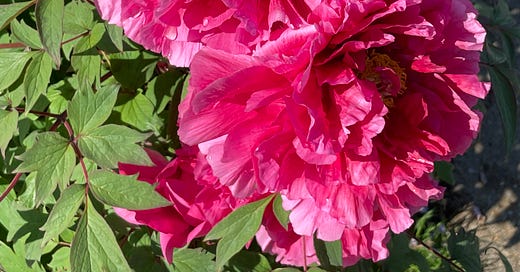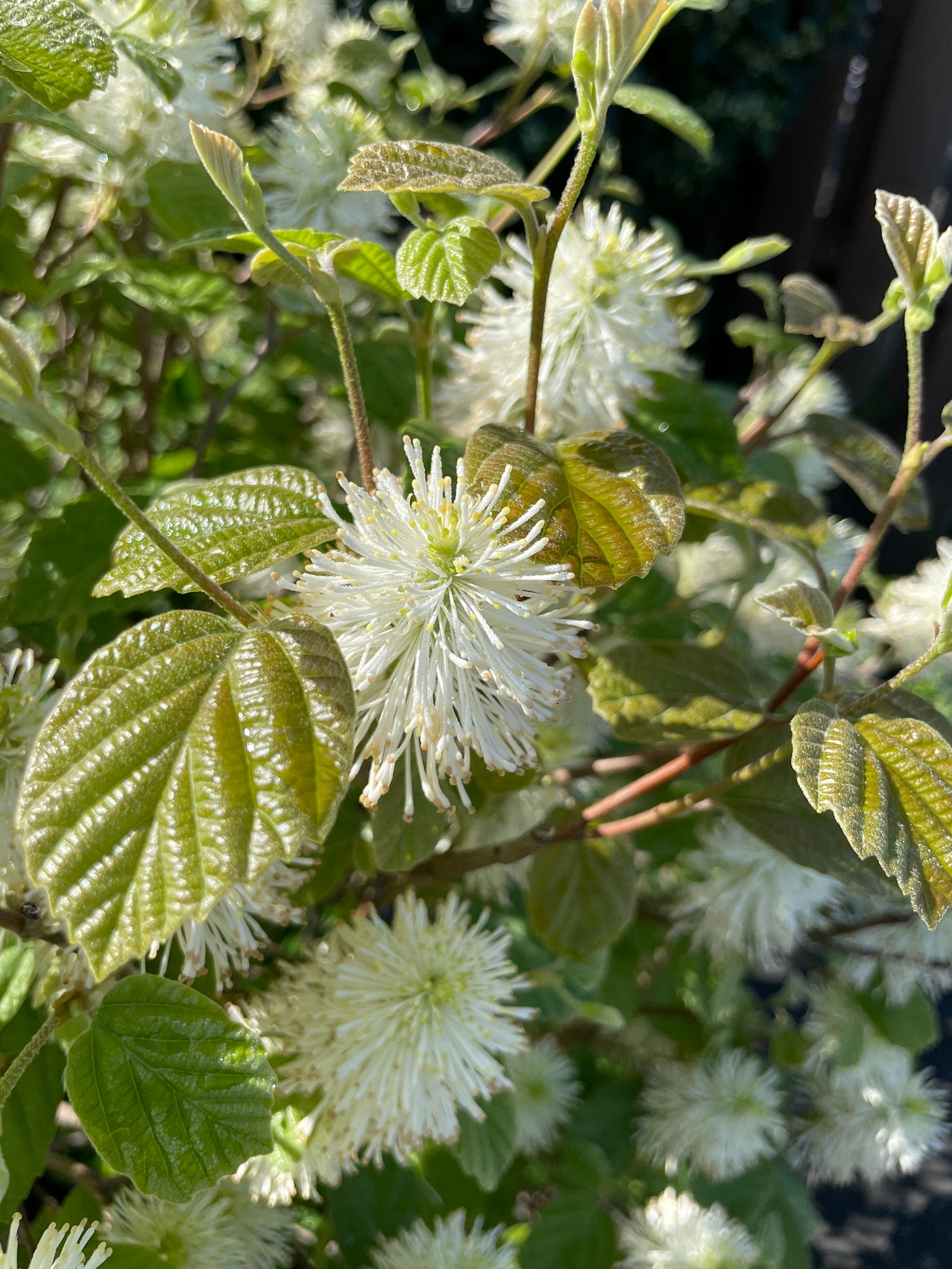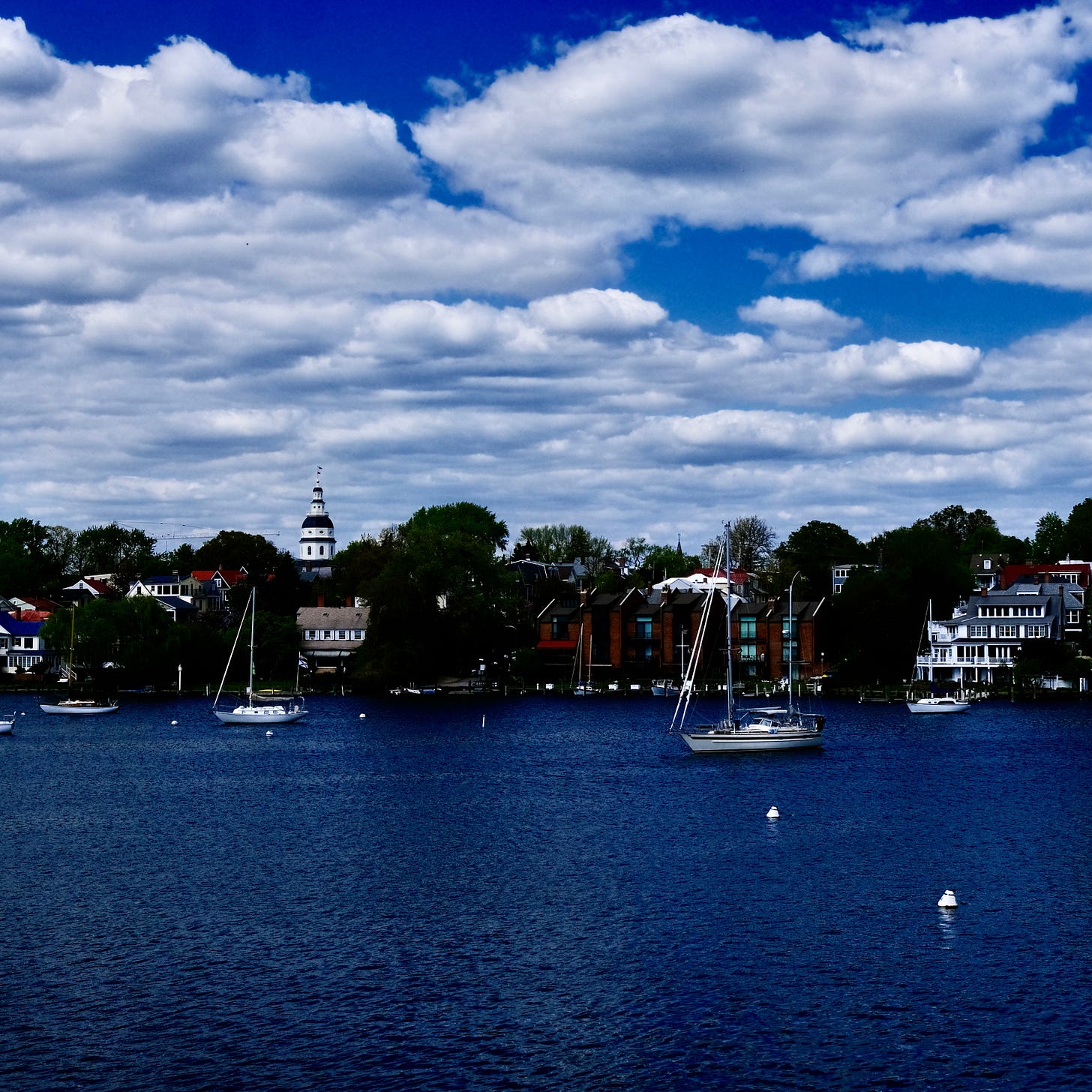We are talking cyber, information, and artificial intelligence Thursday, 20 April between 1000-1100 eastern when Dr. Cassandra Lewis, Chancellor of the College of Information & Cyberspace graces our Timely Topic webinar. I posted the zoom link on Notes this morning. Do hope you can join us.
Spa Creek and its environs are reawakening, with a decidedly greener cast than merely a week ago. The Creek has three boats anchored near us (yay!) and three others in what I refer to as the inner Annapolis harbour (up Spa Creek from the Compromise Street Bridge linking Annapolis to Eastport). Midshipmen (not their female counterparts) are running with their shirts off. The water taxis are gradually populating the waters again. Touristas have found us again. Planting is occupying much time as people bring colour back to our vicinity (yay again)
.
I never learned to garden from my parents, though each enjoyed it. My mother loved gardening but, as true with everything except banking which she knew inside and out, Mary stressed about what the neighbours would think. I ran from discussing it with her because I did not need that angst. She was fearful of oh so much.
My father puttered around in his backyard, composting before it was trendy (being good southerners, it was a ‘compost heap’). He loved thrived outside, often rebuilding the patio he installed in the home they had here in the 1970s and 80s. He loved cutting the grass because he would allow himself a soft serve ice cream cone afterwards. That quintessential treat meant a great deal to him because he never had it as a kid.
While my mother’s family was hardly secure financially, my dad’s family faced one of those Depression Era stories we have all heard: itinerant farming in the Dust Bowl. A juvenile family member sent away due to tuberculosis, only to be the sibling he wrote hard copy letters to every single day of his life because he feared he would never see her again. Little food, never pets, and ultimately losing both parents in his teens. Ice cream of any sort just wasn’t part of the program.
Going out, in his 60s, to buy a soft serve ice cream cone after mowing the lawn was a luxury of surprising import. It was a really big deal just like rice pudding for dessert.
No, I am not kidding. My father grew up in a family where rice pudding was such the only extremely rare treat that silenced him, harkening back to parents long gone and siblings he did not see much later in life. As a result, he was somewhat flummoxed when he moved to Asia in his 50s to find Asians are rice without milk.
My father found Asia absolutely fascinating because it wasn’t what he knew but he really had a hard time with people eating rice that was prepared other than rice pudding.
No, I am not making this up. Far too many people forget the culinary impact globalisation has had on us. Of course we eat rice today as a starch in conjunction with several cuisines but doesn’t everyone know that? I have several types in my pantry: black, basmati, Carolina, CalRose, and probably something I am forgetting.
Americans know that rice may be a central ingredient in Persian, Chinese, Mexican, Indian, Japanese, Thai, Indonesian, and Vietnamese cuisines. It’s certainly eaten in the United States but we realise that other cultures thrive on it as we tend towards French fries as our starch.
Cuisines of the world show the effects of globalisation every single day, from breakfast to our end of the day snacks. Yet, we too often forget the role globalisation plays in introducing us widely to some foods (and countless other items) long restricted merely to ethnic restaurants tucked into cities around the world. Globalisation was not just good for trade but specifically for food trade.
Of course when I bought blueberries today they were Chilean because the bumper crops from New Jersey won’t arrive for at least two and a half months, if not three. But, Chile is entering the autumn right now so their magnificent crops are available for export at relatively low rates. Yet we take these items for granted.
Fresh fish from across the world was virtually impossible to acquire before globalisation made it a daily option on many restaurants’ menus. Similarly, spices which were historically a reason for trade from Europe along the Silk Road or Christopher Columbus allegedly seeking a shorter route to the Asian spice markets when he came towards the western hemisphere are staples of our cultural history. They also are important for many people’s daily planning of recipes, even if they forget how exotic some of these products are versus the American native species of plants in various seasonal growth patterns.
With the United States as large as it is, even the corn I saw this morning serves as a reminder that we take for granted the availability of things from everywhere all the time. If we want caviar, there must be a store, especially in metropolitan, affluent areas to procure it daily, if not 24/7. How about lutefisk, that rather ethnic fish from Scandanavia that is cured in lie for ages? Of course it’s been available to Minnesotans or those in the old Swedish neighbourhood of Andersonville for well over a century but lutefisk can be procured (if you want it for some reason) anywhere in the country.
The list of effects this economic interplay created is amazing with food only a tiny but notable part. Globalisation is a bane for many who curse it weakening our society, sucking away jobs to go overseas, and leading in no small part to the political paralysis we confront.
Globalisation also opened the world to us. For that we should be joyous. We lived in a pretty isolated world regardless where we were located. Perhaps this trend undermined some aspects of society but it also made many appreciate what we have.
There are rarely completely positive or negative views on something like globalisation. Its effects are so vast across the spectrum. We have had it for three decades, minimally, so people have forgotten some of the eye-opening aspects such as food.
My dad didn’t live to see globalisation as we generally define it, even though he worked overseas much of his life. He may not have taught me gardening (though I have been an obsessive composter for decades) but he never missed reminding me that polarised views of anything usually miss a lot. He would have said there was good in blueberries but carbon costs in shipping from Chile. The idea that actions create consequences—and responsibilities—was his creed he definitely provided me.FIN






